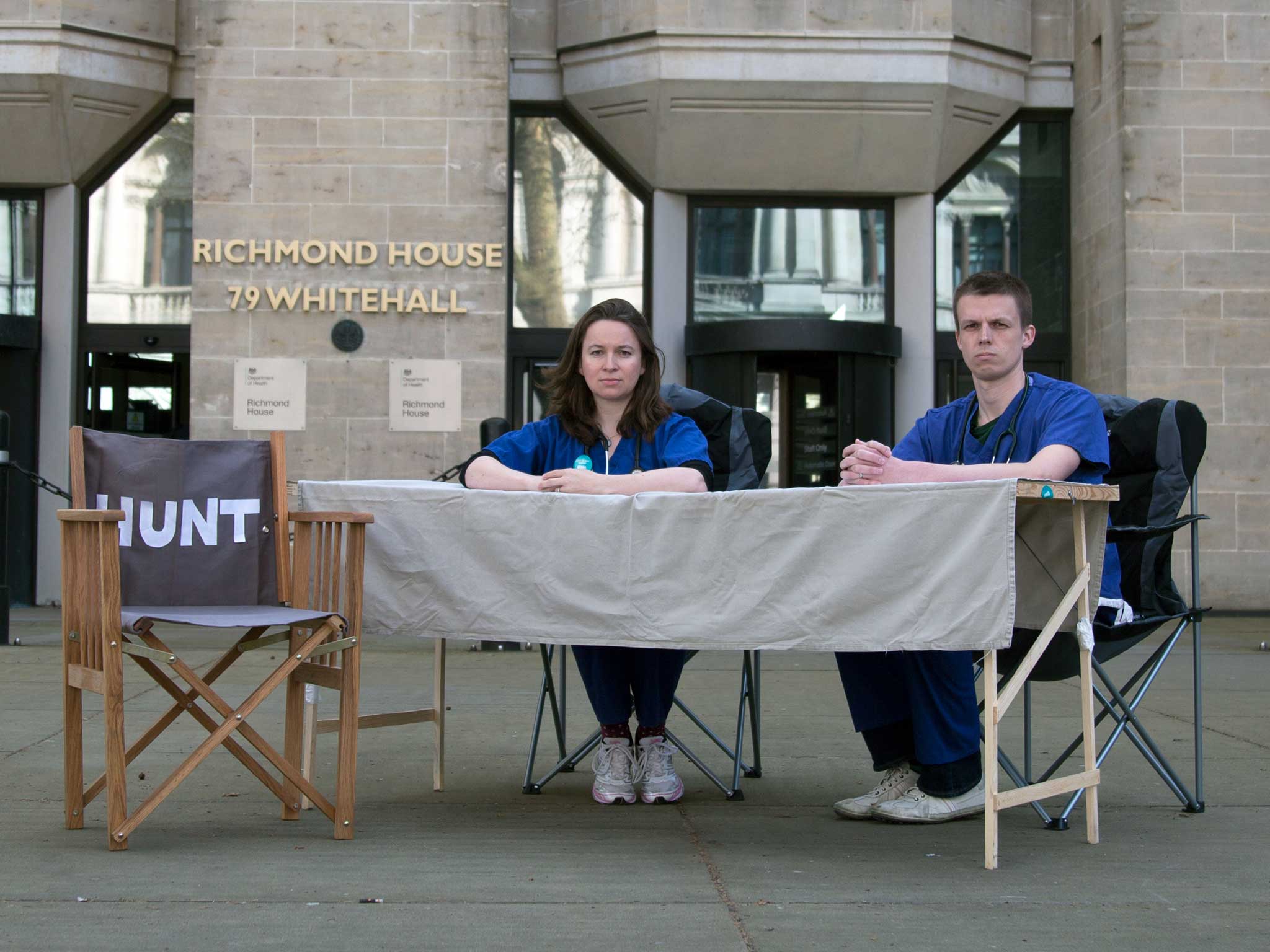Junior doctors begin permanent protest outside Department of Health
Exclusive: 'Political leaders should be working with the profession to solve problems and improve care, not simply bulldoze concerns into the dust,' doctor says

Junior doctors have begun what they say will be a permanent protest outside the Department of Health, to call for Jeremy Hunt to re-open talks and avert unprecedented strike action due to take place at end of the month.
Two medics from the grassroots junior doctor campaign began the protest this morning by requesting a meeting with the Health Secretary at the DoH building in Whitehall.
After being met by an official who said he would check the Health Secretary's availability, the doctors set up a protest outside the entrance to the building.
In a statement, they said they would wait for 24 hours. Their place will then be taken by other doctors, two at a time, for 12 hours each day, until "meaningful talks" are held, the doctors said.
Neither of the two doctors, Dr Rachel Clarke and Dr Dagan Lonsdale, hold official positions at the British Medical Association, the union responsible for negotiations with the Government over the disputed new junior doctors contract.
However, both have been active campaigners in the grassroots movement to oppose the contract.
Junior doctors are due to hold the first all-out strike in the history of the NHS, withdrawing even from emergency care, between 8am and 5pm on 26 and 27 April.
No talks have been held between the BMA and the Government since February, when Mr Hunt, acting on advice from his chief negotiator, the hospital chief executive Sir David Dalton, ended the negotiation process and decided to impose the new contract from August.
Dr Clarke, a cardiologist from Oxford, said that doctors around the country were now “absolutely desperate”.
“Dialogue is so obviously the only way to end this dispute. All of us have a duty here to put patients first and do everything possible to avert further strikes,” she said.
In pictures: Junior doctors protests in UK
Show all 10Dr Lonsdale claimed Mr Hunt and David Cameron were “ignoring 54,000 whistleblowers” in the medical profession.
“Political leaders should be working with the profession to solve problems and improve care, not simply bulldoze concerns into the dust,” he said.
“Doctors like me have dedicated our lives to providing safe and effective care for others. We have no interest in healthcare policy that is driven by soundbite electioneering.”
The imposition of the new contract, which will require junior doctors to work more weekend shifts, for less pay on Saturdays, is opposed by most in the medical profession.
The Academy of Medical Royal Colleges has called for both the BMA and the Government to “step back from the brink” and resume talks.
But the prospect of withdrawing emergency cover has proved divisive in recent days.
NHS England medical director, Professor Sir Bruce Keogh, has said that to do so would go against the “ethical framework” of the medical profession, and the Royal College of Emergency Medicine has said that “conscience will dictate” whether its members should take part.
However, the Royal College of Obstetricians and Gynaecologists has said it was confident emergency cover would be provided by consultants and urged the DoH “to reflect upon its actions and behaviour”.
Junior doctors voted 98 per cent in favour of industrial action in a BMA ballot last year.
The contract is opposed on a number of grounds, with particular concerns over patient safety if doctors are rostered to work more weekends, with a knock-on effect on staffing levels during the week.
While junior doctors will receive an average basic salary increase of 13.5 per cent to compensate for the loss of Saturday premium payments, the new contract will remove automatic annual pay increases, which doctors say will hit the pay of women doctors who take time out for maternity leave, and those who take time out for academic work.
An Equality Impact Assessment conducted by the Department of Health conceded the contract would have a disproportionate impact on women, but concluded it was not discriminatory.
Subscribe to Independent Premium to bookmark this article
Want to bookmark your favourite articles and stories to read or reference later? Start your Independent Premium subscription today.

Join our commenting forum
Join thought-provoking conversations, follow other Independent readers and see their replies